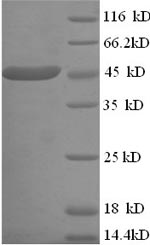The preparation of this recombinant Human CKMT1A protein was to use gene recombination DNA technology to obtain a recombinant vector connected with a CKMT1A fragment (40-417aa) that could be translated into the CKMT1A protein and then transferred it into E.coli cells to express the recombinant CKMT1A protein molecule. In order to get the target protein with high purity, N-terminal 6xHis tag was used in the production. The purity is 90% determined by SDS-PAGE.
Mitochondrial creatine (MtCK) kinase is responsible for the transfer of high energy phosphate from mitochondria to the cytosolic carrier, creatine. It belongs to the creatine kinase isoenzyme family. It exists as two isoenzymes, sarcomeric MtCK and ubiquitous MtCK, encoded by separate genes. Studies suggested that mitochondrial creatine kinase 1 in non-small cell lung cancer progression and hypoxia adaptation. In addition, CKMT1 is a key regulator of the permeability transition pore through a complex that is distinct from the classical permeability transition pore. The knock-down of the mitochondrial creatine kinase-1 by RNA interference causes the dissipation of the mitochondrial membrane potential. Mitochondrial creatine kinase-1 has been found to serve as a universal and functionally necessary gatekeeper of the PT-pore, as its depletion induces mitochondrial depolarization and apoptotic cell death.






